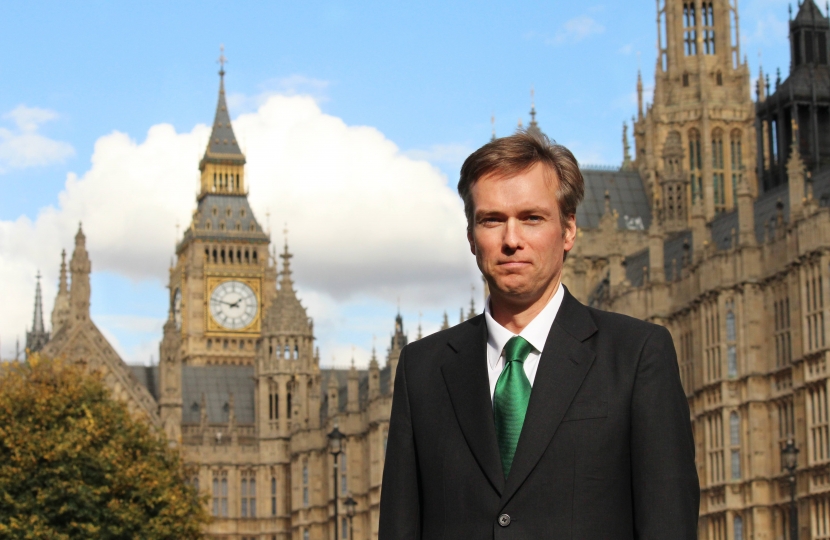
Henry Smith MP has welcomed the Chancellor of the Exchequer’s announcement in the Autumn Budget on 22nd November that £1.5 billion is being directed to help people transition onto Universal Credit, the Government’s flagship welfare reform programme which puts work at the heart of the benefits system.
The Chancellor, Rt Hon Philip Hammond MP, announced that the Government would reduce by seven days the time a claimant must wait before their first full benefit payment.
The period that the interest-free benefit advance can be recovered was extended from six months to one year. It was also confirmed that the amount of an advance would go from 50 per cent of the monthly entitlement to 100 per cent, meaning that a claimant could receive the equivalent of their first benefit payment up front.
Henry said;
“Universal Credit has been transforming lives by enabling more people get into jobs and earning more through work. I’m glad to see the Government has acted to cut down the initial waiting time and allow individuals who need it to get the equivalent of a full benefit payment right up front.
“Combined with other measures to provide an extra two week payment of Housing Benefit, worth an average £233, and the option to continue having rent paid directly to landlords in the private rented sector, the Budget will provide a real boost to people going onto Universal Credit.”
Universal Credit sees six existing benefits, for people on low incomes or out of work, replaced by a single Universal Credit payment. The programme is being rolled out across the UK in stages and is designed to help jobseekers with particular challenges to receive tailored help in order to secure one of the over 780,000 vacancies which exist in the jobs market.
The Crawley MP also welcomed other Budget announcements. On the Personal Allowance increasing to £11,850, Henry said;
“More than 56,000 Crawley residents have already benefited from increases in the Personal Allowance, and I welcome confirmation that the amount people earn before paying income tax will rise to £11,850 from next April.”
On the April 2018 increase in the National Living Wage and the National Minimum Wage, Henry said;
“There’ll be an increase in the National Living Wage for workers aged 25 and over from £7.50 per hour to £7.83 per hour. This will start in April 2018 and more than 2 million people are expected to benefit.
“For a full-time worker, this will represent a pay rise of some £600 a year.
“There will also be increases in the National Minimum Wage for 21 to 24 year olds, 18 to 20 year olds, 16 and 17 year olds, and Apprentices.”
On measures to abolish stamp duty land tax on homes under £300,000 for first-time buyers, Henry said;
“95 per cent of first-time buyers who pay stamp duty will benefit from these changes, and first-time buyers of homes worth between £300,000 and £500,000 will not pay stamp duty on the first £300,000. This will save £1,660 on the average first-time buyer property.
“Around 80 per cent of people buying their first home will pay no stamp duty at all.”
Notes to Editors:
Budget measures on Universal Credit include:
- Local authorities will be able to recoup over 80 per cent of the money they spend on temporary accommodation directly from the Department for Work & Pensions rather than from the claimant, preventing losses of more than £70 million in 2018-19.
- Extended partnership working with Citizens Advice, to provide more face to face support to Universal Credit claimants.
- Abolishing the seven day waiting period to reduce the wait for payment from six weeks to five from February 2018.
- Extending the repayment of advances from six to 12 months, and allowing people to receive 100 per cent of their payment upfront from January 2018. People who make a claim in December can get a 50 per cent advance, and then in January can ask for a top up to 100 per cent.
- Making it possible for people to apply for advances online from spring 2018, making it even easier for a claimant to access an advance if they need it.
- Paying an additional two weeks of housing costs after the end of someone’s Housing Benefit claim and into their Universal Credit claim from April 2018, and making it easier for claimants to continue having their housing costs paid directly to landlords once they are on Universal Credit.
- To allow these improvements to be made as quickly as possible, changing the rate of Universal Credit Full Service for three months from February 2018 to ten Jobcentres a month, increasing to 41 in May 2018.
